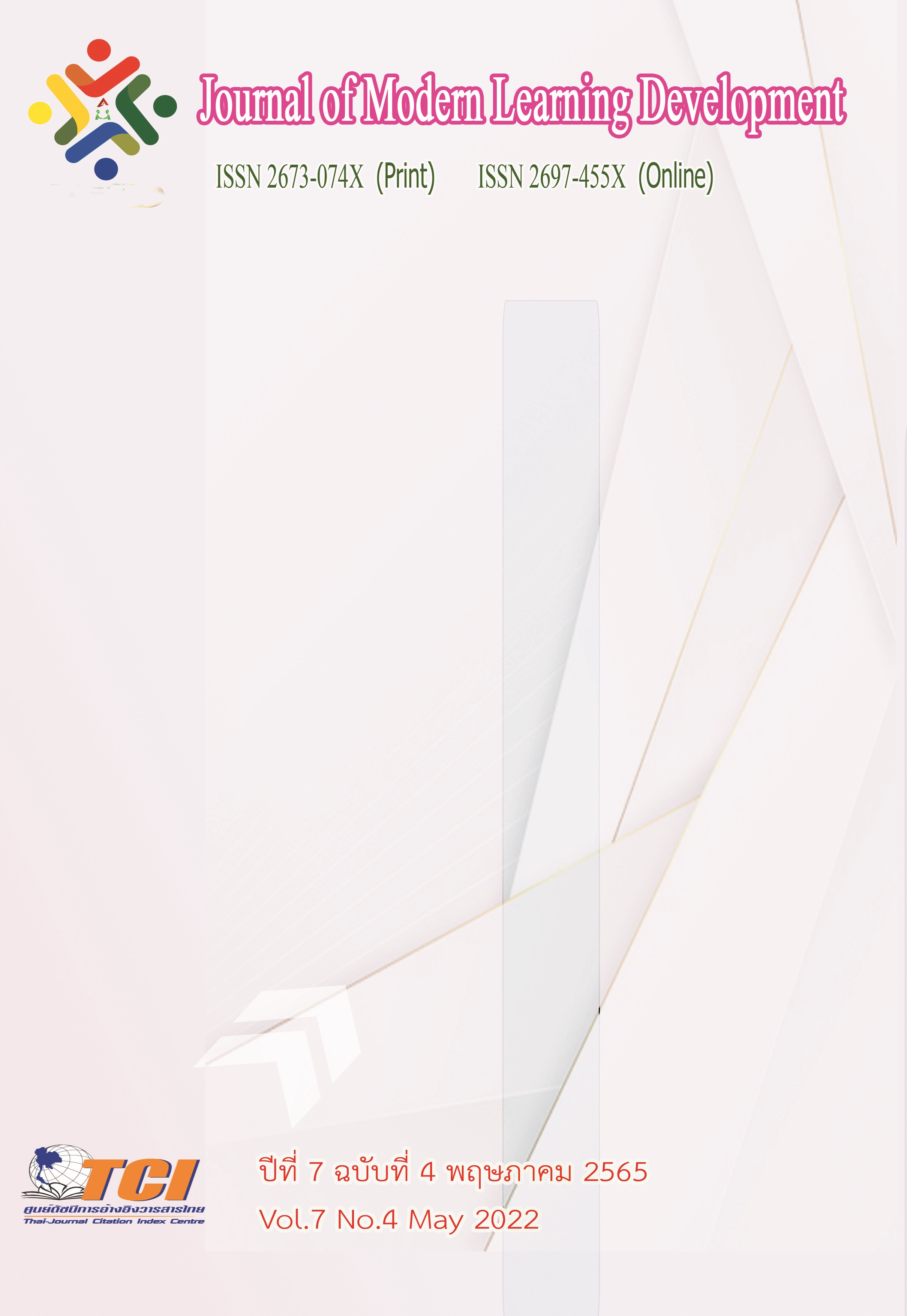The Development of Vocabulary Learning Using Game Based Learning for Grade 13 Students
Main Article Content
Abstract
This research is experimental research. The purpose of this study was to compare English vocabulary using Games Based Learning (GBL) before and after class. The sample group used in this research was 28 students with in Chachoengsao province. The sample was obtained by simple random sampling. The research tools were 1. lesson plans for English vocabulary using Games Based Learning (GBL). 2) pre- test and post-test. The statistics used in the data analysis were mean, standard deviation and dependent samples t-test. 3) evaluate the satisfaction of the students learning the vocabulary with games. The statistics in the data analysis were descriptive statistics to find mean, standard deviation and t-test of pre-test and post- test of students. The satisfaction of students with the Games Based Learning (GBL) using descriptive statistics to find the mean and standard deviation.
The results of the research can be summarized as follows: 1) Students who learned English vocabulary Games Based Learning (GBL). The results showed that after school was significantly higher than before at the .01 level. 2) The students were satisfied with learning English vocabulary using games at a highest level
Article Details
References
กรมวิชาการ กระทรวงศึกษาธิการ. (2551) . หลักสูตรแกนกลางการศึกษาขั้นพื้นฐาน พุทธศักราช 2551. กรุงเทพมหานคร: โรงพิมพ์องค์การรับส่งสินค้าและพัสดุภัณฑ์.
ชฎาพร ยางเงิน. (2562).การพัฒนากิจกรรมการเรียนรู้คำศัพท์ภาษาอังกฤษโดยใช้เกม ความพึงพอใจของนักเรียนชั้นประถมศึกษาปีที่ 2 ที่มีต่อการจัดกิจกรรมการเรียนรู้คำศัพท์ภาษาอังกฤษโดยใช้เกม.วารสารช่อพะยอม มหาวิทยาลัยราชภัฏมหาสารคาม. 30 (1),95-103.
โชติมา วัฒนะ. (2563) .พฤติกรรมการใช้สารสนเทศของนิสิตปริญญาตรี มหาวิทยาลัยศรีนครินทรวิโรฒ.วารสารบรรณศาสตร์ มหาวิทยาลัยศรีนครินทรวิโรฒ. 13 (2),1-11.
ณัฐวราพร เปลี่ยนปราณ,และสุทัศน์ นาคจั่น. (2558). การเรียนรู้คำศัพท์ภาษาอังกฤษโดยใช้เกมประกอบการสอนการของนักเรียนระดับประถมศึกษาปีที่ 6 โรงเรียนวัดทุ่งน้อย อำเภอกุยบุรี จังหวัดประจวบคีรีขันธ์. วารสารอิเล็กทรอนิกส์.มหาวิทยาลัยศิลปากร. 8 (2),1672-1684.
บุษรีย์ ฤกษ์เมือง. (2552). การใช้เกมคำศัพท์ภาษาอังกฤษเพื่อพัฒนาการเรียนรู้คำศัพท์ภาษาอังกฤษ สำหรับนักเรียนชั้นประถมศึกษาปีที่4 โรงเรียนบุรารักษ์. วิทยานิพนธ์ศิลปศาสตรมหาบัณฑิต สาขาวิชาการสอนภาษาอังกฤษในฐานะภาษาต่างประเทศ. บัณฑิตวิทยาลัย: มหาวิทยาลัยศรีนครินทรวิโรฒ.
ยุพา ทองโปร่ง. (2552).การใช้เกมคำศัพท์ประกอบการเรียนการสอนที่มีทัศนคติและผลสัมฤทธิ์ในการเรียนรู้คำศัพท์ภาษาอังกฤษของนักเรียนชั้นประถมศึกษาปี ที่ 5 โรงเรียนบ้านพุน้อย.งานวิจัยชั้นเรียน.
อนุภาพ ดลโสภณ. (2540). การเปรียบเทียบผลสัมฤทธิ์ทางการเรียนวิชาภาษาอังกฤษของนักเรียน ชั้นประถมศึกษาปีที่ 5 ระหว่างการสอนโดยใช้เกมและการสอนตามคู่มือครู. วิทยานิพนธ์ศึกษาศาสตร์มหาบัณฑิต สาขาการศึกษาการประถมศึกษา. บัณฑิตวิทยาลัย: มหาวิทยาลัยมหาสารคาม.
Harmer, J. (1991). The Practice of English Language Teaching: New Edition. New York: Longman.
Johnson. (2001,April). A Comparison of The Use of The Active Games Learning Medium with Passive Games and Traditional Activities as a Means of Reinforcing Recognition of Selected Sight Vocabulary Words with Mid-Year First-Grade Children with Limited Sight Vocabulary. Dissertation Abstracts. IO : 6456 – A.
Wilkins ,D.A.(1972). Linguistics in Language Teaching. Australia: Edward Arnold.


